Jeremy Corbyn urges Labour to lead 'resistance' to Conservatives in 2020
- Published

Mr Corbyn will continue to lead his party in Parliament into 2020
Jeremy Corbyn has urged Labour to lead "the resistance" to Boris Johnson's Tory government over the coming year despite its crushing election defeat.
In his new year message, the party's leader said it faced tough times ahead after its fourth defeat in a row but its movement remained "very strong".
He said there was "no other choice" but to continue the fight against poverty, inequality and climate change.
Several Labour MPs responded angrily, saying Mr Corbyn was in denial.
Neil Coyle, the MP for Southwark and Old Bermondsey, posted a message on Twitter with an image from 'Allo, 'Allo!, the World War Two sitcom set in France.
Allow X content?
This article contains content provided by X. We ask for your permission before anything is loaded, as they may be using cookies and other technologies. You may want to read X’s cookie policy, external and privacy policy, external before accepting. To view this content choose ‘accept and continue’.

And Phil Wilson, who lost his Sedgefield seat to the Conservatives, said Mr Corbyn was "one of the enablers of Boris Johnson".
The Labour leader has said he will stand down once a successor has been elected early in 2020. A number of senior Labour politicians have said they are considering entering the race to succeed him, in a contest due to begin in earnest in January.
The early contenders include Rebecca Long-Bailey, Emily Thornberry, Keir Starmer, Lisa Nandy and Clive Lewis - while Angela Rayner, Yvette Cooper, Jess Phillips, David Lammy and Ian Lavery could also put themselves forward if they secure enough support.
In his traditional leader's new year message, Mr Corbyn makes no direct reference to the election result or his own future, suggesting 2019 had been "quite the year for our country and for our Labour movement".
While the party is set to be out of power for at least another four years, he said it must continue to make its influence felt and stand up for its values.


Having led Labour so recently to defeat, this message was hardly going to be brimming with optimism.
But Jeremy Corbyn does focus on his legacy as he prepares to step down. He tells his supporters that they have built a movement which is 500,000 strong and that they can form the resistance to Boris Johnson, not just in Parliament but on the streets.
In the new year, Labour members will have to decide whether they want a leader who will stick to that message or whether they want the forthcoming leadership contest to result in a change of direction.

"It won't be easy," he said. "But we have built a movement. We are the resistance to Boris Johnson. We will be campaigning every day. We will be on the front line, both in Parliament and on the streets."
He said Labour's priorities must be to ensure the NHS remains free to all at the point of use, preventing the climate crisis causing "irreparable damage" at home and abroad and working with "movements and parties seeking social justice and change all over the world".
"Make no mistake, our movement is very strong... we're not backed by the press barons, by the billionaires or by the millionaires who work for the billionaires. We're backed by you. We are by the many, for the many.
"2020 and the years ahead will be tough - no one is saying otherwise. But we're up for the fight, to protect what we hold dear, and to build to win and to transform. The fight continues. There is no other choice."

Labour's former deputy leader said the past two manifestos had credibility issues
With the contest to succeed him expected to take about three months, Mr Corbyn is set to continue leading the party in Parliament and the country until the spring.
Unlike in 2010 and 2015, when Gordon Brown and Ed Miliband stood down straight away after election defeats, the party has no deputy leader to step in on a temporary basis, with Tom Watson having stood down at the election.
In an interview with BBC Radio 2's Jeremy Vine, Mr Watson said he had yet to decide whether he would endorse any candidate but, if he did. it was "unlikely" to be Ms Long-Bailey or anyone else closely associated with the policies of the Corbyn era.
Mr Watson served as Mr Corbyn's deputy for four years although he was elected to the position by Labour members, not appointed by the leader, and disagreed with Mr Corbyn on Brexit and other issues.
"All the candidates on the frontbench need to explain the last two election defeats," he said. "They signed up to the manifesto in 2017 and 2019 and clearly that was rejected by the electorate."
"The first thing they have to do is to explain to 500,000 Labour Party members why they think it is that we have not won an election for a decade."
Meanwhile, shadow justice secretary Richard Burgon has said he will be standing in the forthcoming deputy leadership election.
Allow X content?
This article contains content provided by X. We ask for your permission before anything is loaded, as they may be using cookies and other technologies. You may want to read X’s cookie policy, external and privacy policy, external before accepting. To view this content choose ‘accept and continue’.

- Published29 December 2019

- Published18 February 2020
